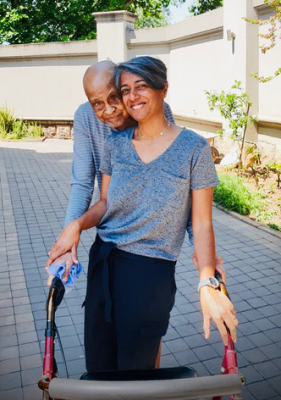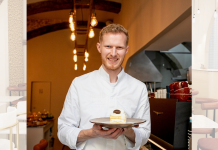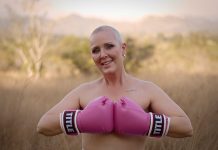Oncologist Prinitha Pillay runs Treating Cancer, a centre offering comprehensive cancer care and state-of-the-art treatment at the new Riverside Medical Centre in Mbombela.
Growing up in Johannesburg, Prinitha’s fondest memories are of the old days when you still walked to school, laughing and happy-go-lucky. “We had our whole lives ahead of us and nothing to hold us back,” she smiles. After graduating in 2003, she completed her internship at a hospital on the Cape Flats and community service at Tintswalo Hospital in Mpumalanga. She joined Doctors Without Borders (DWB) and life became a little less carefree. “It was my first weekend in South Sudan,” she says. “The surgeon fell ill and had to be evacuated, but there was a patient with a gunshot wound to the abdomen. I had to do the surgery, and the next day we had our first case of suspected Ebola. Eish!”

Prinitha realised that this was where her heart lay; she fell in love with humanitarian work and ultimately stayed with DWB for 10 years. “When I started out, we were drowning in preventable deaths due to HIV and TB. During a time of complete denial in SA, I worked in Lesotho trying to get ARVs to those in the out-of-reach mountainous areas. When I think back to my time in South Sudan, I remember mud, so much mud … We built hospitals to help deal with outbreaks of meningitis, cholera and malaria, and trained staff to deal with them. In Sierra Leone, I was in charge of a paediatric and obstetric hospital. The mortality rates of mothers dying in childbirth and babies dying of malaria were so high that we had to intervene. There is one particular image that will always stay with me: the sun rising at the end of a night shift, and mothers walking away from the hospital, carrying their dead children.”
She goes on to describe her work in India, a country she found fascinating. “We provided care for the transgender and LGBTQIA+ community, people who were shunned to the point of not being able to enter hospitals for treatment. Sadly, this is still common the world over.” Prinitha worked in conflict-ridden areas, including Libya in 2011, a time when the country was going through massive change. She recounts an incident when she and a colleague went to Tripoli to provide medical care, but the borders were closed. “So we had to sneak across,” she says. “We could never stay in one place for very long because they were bombing the city. It was heartbreaking to see children caught up in the conflict. Time and again I found myself in a place that resonated deeply with me, being able to help, to witness the struggles and then speak out about it – to give voice to these vulnerable populations.”
Prinitha not only loved her work with DWB, but she also met her “Great Dane”, as she refers to her husband, Jens Pedersen, who is from Denmark. “We were part of a team working very closely together in the desert of Darfur in north Sudan, I suppose it was inevitable that we would fall in love,” she laughs. Prinitha is also very close to her beloved 91-year-old father. “He has dementia,” she explains, “and I try to spend as much time as possible with him. Sometimes we don’t realise it, but time is so precious. He still has his wicked sense of humour and is a joy to be around. Learning to deal with his dementia has helped me to understand the sadness of being ‘locked in’, and the loneliness of the elderly.”
She has also learnt how difficult it is for loved ones to know how to deal with it. Prinitha relates a conversation she had with her dad not long ago. He pointed to her mum’s photograph and asked her if she knew that that was his wife, to which she said yes, she knew that. She asked him where he thought her mum was now, and he said that she is in heaven. Prinitha took his hand and smiled, saying that he would someday meet her there, and he replied, “I try to go to her every single day.” “It broke my heart,” she exclaims.

At the age of 42, Prinitha decided it was time to use her experience and passion to change the conditions that the most vulnerable live under. “I specialised in oncology, knowing that cancer is on the rise and many can’t afford the best treatment,” she explains. “Once someone hears they have cancer, they experience a hum of silent shock, while just wanting to scream,” she says. “I try to hold their hands during this terrifying time when they are filled with fear and uncertainty. My best days are spent reassuring patients and their loved ones, explaining the diagnosis and going over the alternatives for treatment.”
She adds that one of the most frightening concepts is the financial aspect. “Unfortunately,” she says, “people are sold medical aid, happily accepting what they believe they are paying for. It is so disheartening; many people believe that because they are on medical aid they are entitled to any and all treatments, but get a rude shock when they find they aren’t covered. My sense of social responsibility engrained in me in my childhood, allows empathy with those who are wronged, and it goes without saying that I will fight for the best possible treatment for my patient.”
An incredible woman indeed, Prinitha gives hope to the often hopeless, showing them that all is not lost. “We can’t simply discard someone because they have been given a cancer diagnosis,” she says, “and too often that is exactly what happens.” She adds that she lives by a certain motto. “Treat the world as if it’s your home. Wander with a restless curiosity, be receptive to sweetness and never forget to duel with the dark. But most importantly of all,” she smiles, “always be kind.”






